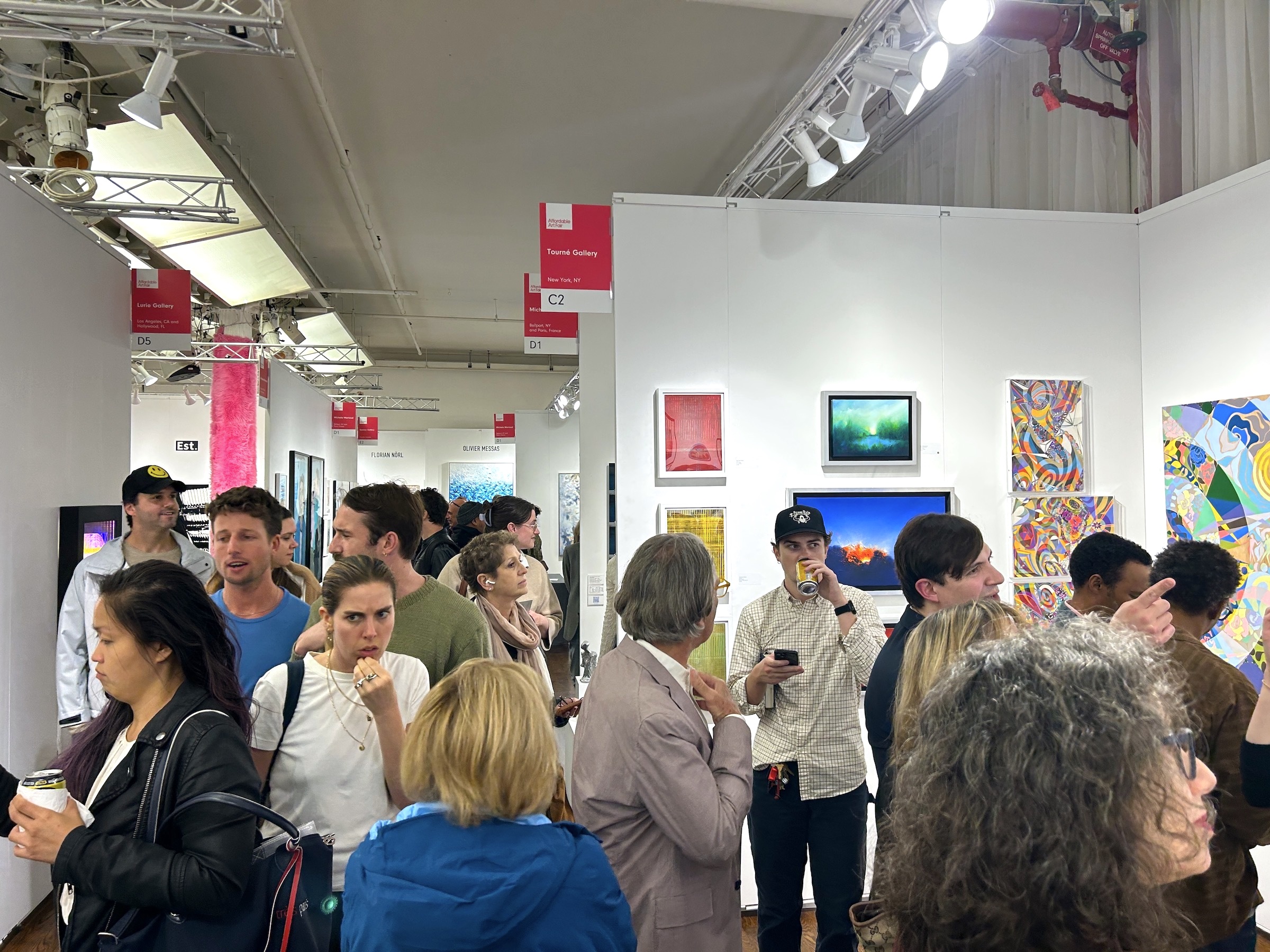When I arrived at Chelsea’s Metropolitan Pavilion in Manhattan on Thursday, the opening day of the Affordable Art Fair (AAF), a long line spilled out of the venue’s entrance and wrapped around the corner of 18th Street and 6th Avenue. With 77 participating galleries representing works by more than 400 living artists, the fair, open through this Sunday, is known for offering works for sale as low as $100 and as high as $12,000 — a modest comparison to the exorbitant prices at fairs like the Armory Show and Frieze.
Over the past year, AAF has been attracting more fairgoers and selling more works. After generating $3.5 million in art sales last fall, the fair sold $5.1 million worth of artwork in the spring, an achievement that the fair’s public relations advisor, Veronica Petty, attributed to a “sweet spot” in prices ranging between $10,000 and $15,000.
As soon as I entered, I was met with an exceptionally large elephant soft sculpture by professional puppet builder and self-taught painter Manju Shandler, presented by Brooklyn nonprofit Arts Gowanus. An amalgam of repurposed paintings and textured fabrics, the work is aptly titled “The Elephant In The Room” (2024) and was first exhibited this summer during Upstate Art Weekend at Shandler’s barn venue in Kerhonkson, New York.
Shandler told me that this is the second time she has participated in AAF since her first exhibition with the now-defunct Gallery Ho eight years ago. When I inquired about the cost of the gargantuan fabric sculpture, she said that the price depends on the buyer and what they plan to do with the work. Shandler asked if I was interested in purchasing it, and I had to admit that it would sadly never fit in my tiny studio apartment and also likely pose a conflict of interest.

“In New York, most people don’t really have a space for it, so this is something I kind of made because — I don’t know, artists are weird and they have this impulse that they want to make things, right?” Shandler said. “It would look great in a children’s museum or something like that.”
I weaved my way through throngs of fairgoers clutching VooDoo Ranger and Fat Tire beer cans, passing by drooping disco balls at the booth of Fremin Gallery, a wall of various pigeon portraits, and a pair of glossy cherry sculptures presented by Palma Arte gallery that reminded me I had still not eaten dinner.


At Established Gallery’s booth, Brooklyn textile and sculpture artist Traci Johnson is exhibiting a new series of tufted rug works contending with their self-perception amid feminine beauty standards. The work “Whispers of Silk” (2024) depicts past, present, and future versions of the artist “killing each other” to reveal a contemplative spidery being in the center. It takes the shape of bamboo earrings — “a status of femininity” that Johnson said they felt they “could never acquire or wear” while growing up.

“Now at this point in my life, I realize that I don’t have to,” the artist told me. A returning participant in AAF, Johnson said they enjoy the fair for its accessibility and unpretentious spirit that welcomes both veteran and first-time collectors alike.
“It’s not intimidating, as opposed to other fairs, where it’s very much like, ‘Who are you? What other credentials do you have? Do you have $20,000?’” Johnson said.


As I squeezed my way through the first floor’s densely packed crowds, passing by an abstract rendering of the Pink Panther and holographic wallworks that made my head spin, I caught glimpses of gallerists and collectors parading recently sold works, freshly parceled in packaging paper and stretch wrap. At a booth for the Art Pantheon Gallery, which is based in Lagos, Nigeria, the attendants pointed out two massive paintings by artists Toromade Tosin and Toju Clarke that had already sold before the fair even opened.
“We announced our participation [in AAF] in Lagos, and a collector saw the two works and said she wanted them,” art consultant and handler Nana Asumah told me, adding that at the fair, many visitors showed interest in “Bearer of Strength” (2024) — another painting by Tosin that grapples with heteronormative masculine expectations. This is the first year the gallery has participated in AAF and although it was only the first night, Asumah said she wants to come back for future iterations.
Upstairs on the slightly-less suffocating second floor, I met artist Natalie Koren Kropf at the Artios Gallery booth, which is exhibiting her swirly mixed-media paintings and sculptures made of bronze and rockite. “Over The Moon” (2024), one of her newest works in this series based on musical movements, was priced at $12,000 and had sold earlier in the evening. A second-time returning fair participant, she said her favorite part is the crowd the show draws.
“I love the people who come here, my fellow New Yorkers,” Kropf said. “The fair is small. It’s not super overwhelming and quite affordable,” Kropf told me, adding that she prefers the “seclusion” of the second floor.

With 15 minutes left of the fair, I scoured the crowd in search of a buyer and quickly found myself talking to Joanne and Lauren Scevola, a mother and daughter from New Jersey. As a “birthday treat” to herself, Lauren had purchased a $700 mixed-media work by Korean artist Bu-kang Lee, who was exhibiting with Mookji Art Contemporary. She said she was moved by the artist’s practice, in which he recreates buildings razed for new developments by repurposing the scrapped plywood and materials.
“We’ll definitely be coming back,” they said.






